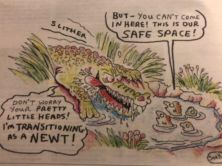New Zealand's reporting guidelines on suicide, which were created in 1999, are currently being looked at for revisions. (Credit: Moh.govt.nz)
Reporting guidelines on suicides might change in New Zealand, which has one of the highest rates of youth suicides in the world.
Last week, members of the media and “mental health professionals” discussed revisions to the guidelines, prodded by a recommendation made by chief coroner Judge Neil MacLean last year, New Zealand Press Association reported.
MacLean had advocated that the media “widely” report on suicide because he thinks “responsible reporting could potentially save lives.” His office is currently restricted from revealing much information on suicide deaths by the Coronoers Act of 2006.
According to the press association, coroners are only legally allowed to give out “name, age, occupation, and finding of self-inflicted death,” making it hard for media to report on suicides.
Beacuse of New Zealand’s guidelines, MacLean commented that New Zealand’s laws on suicide reporting are “the most restrictive” and called for a review of the guidelines to open them up and allow more reporting on suicides.
The guidelines (see here) were created in 1999 and haven’t been revised since. They advise that media outlets “avoid inadvertently glorifying suicide” and let people know how to get help. Also, reporters are reminded of the possibility that reporting leads to copycat suicides.
“It’s too early to say but I think there will be some changes,” associate health minister Peter Dunne and chairman of the meeting, reportedly told the press association. “This is an important opportunity to really improve the understanding and handling of suicide in our public forums, and we do not want to just swap one set of words for another.”
But, an organization that represents suicide victims’ families complained because they weren’t included in the meeting to look at revisions of the guidelines, reported the newspaper Otago Daily Times.
The organization, Community Action on Suicide Prevention Education and Research (CASPER), represents roughly 500 families and states on its website that it is a networking, support and educational group. The organization reportedly asked to be included but Dunne told them the meeting was media-only.
“I think most New Zealanders would be appalled at the way in which (Mr Dunne) ignores and belittles families bereaved by suicide,” CASPER spokesperson Maria Bradshaw is quoted as saying.
Dunne’s spokesperson responded that there will be more inclusion in further meetings and that last week’s was “just the starting point.”
iMediaEthics wrote about the ethics of reporting on suicides last September. Read that story here.
iMediaEthics has written to Ministry of Health and CASPER for comment and will update with any response.




